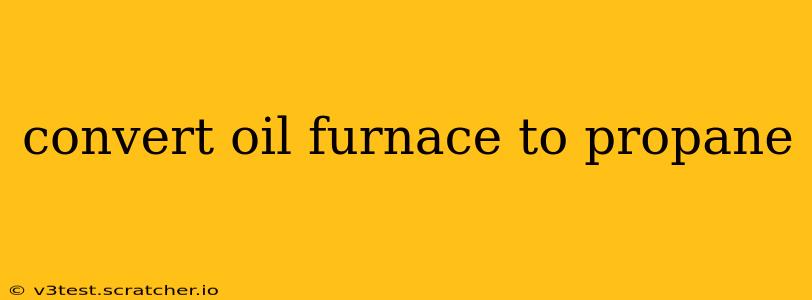Switching from oil to propane for heating your home offers potential cost savings and environmental benefits. However, converting your oil furnace to propane isn't a simple DIY project. It requires the expertise of qualified HVAC professionals and careful consideration of several factors. This comprehensive guide will walk you through the process, addressing common questions and concerns.
What are the advantages of converting to propane?
Propane offers several advantages over heating oil. It's generally more affordable, and its cleaner burning nature contributes to reduced emissions and a smaller carbon footprint. Furthermore, propane is readily available and stored safely in tanks, eliminating the need for large, underground oil tanks. The price fluctuation of propane also tends to be less volatile than oil, providing more predictable heating costs.
Can I convert my oil furnace to propane myself?
No. Attempting a conversion without proper training and licensing is extremely dangerous and illegal in most jurisdictions. Oil and propane systems operate under different pressures and require specialized knowledge to handle safely and effectively. Improper conversion can lead to gas leaks, explosions, and carbon monoxide poisoning. Always hire a qualified and licensed HVAC technician experienced in propane conversions.
What does converting an oil furnace to propane involve?
The conversion process involves more than just switching fuel sources. A qualified technician will assess your existing oil furnace and its compatibility with propane. This includes:
- Inspecting the furnace: The technician will thoroughly inspect the furnace for any damage or wear and tear. Some older furnaces may not be suitable for conversion.
- Adjusting the burner: The oil burner will be removed and replaced with a propane burner designed for the specific furnace model. This often involves adjustments to the air-fuel mixture for optimal combustion.
- Checking the venting system: The venting system needs to be inspected and potentially modified to ensure safe and efficient propane exhaust. Different venting requirements apply to propane versus oil.
- Testing and safety checks: After the conversion, the technician will perform thorough testing to ensure the system operates safely and efficiently, checking for gas leaks and proper combustion.
- Permitting: You might need to obtain permits from local authorities before and after the conversion. Your technician can guide you through this process.
How much does it cost to convert an oil furnace to propane?
The cost varies greatly depending on several factors, including the size and age of your furnace, the complexity of the conversion, and your location. Labor costs are a significant portion of the total expense. It's best to obtain multiple quotes from reputable HVAC technicians to compare pricing and services.
What is the lifespan of a propane furnace?
With proper maintenance, a propane furnace can last for 15-20 years or even longer. Regular servicing, including cleaning and inspections, is crucial to extend the life of your furnace and ensure its efficient operation.
Is it worth converting my oil furnace to propane?
The decision to convert depends on several factors, primarily your current heating costs, the age and condition of your oil furnace, and the availability and cost of propane in your area. A cost-benefit analysis, comparing the cost of conversion to projected savings on fuel costs, will help determine the financial viability of the conversion. Weighing the environmental benefits against the cost is also an important consideration.
Can I use propane in my existing oil tank?
No. Oil and propane are incompatible substances. You cannot use your existing oil tank for propane storage. Propane requires a dedicated tank, which usually involves installing a new propane tank outside your home, or connecting to an existing propane supply line.
How long does the conversion process take?
The conversion process typically takes a few hours to a full day, depending on the complexity of the work. Scheduling the work should ideally be done during off-peak heating seasons to minimize disruption.
By understanding the process, potential costs, and benefits involved in converting your oil furnace to propane, you can make an informed decision that meets your home's heating needs and budget. Remember, always enlist the services of a licensed and qualified HVAC technician for a safe and efficient conversion.
